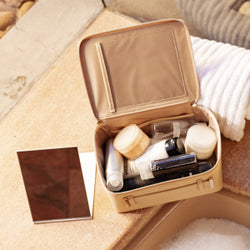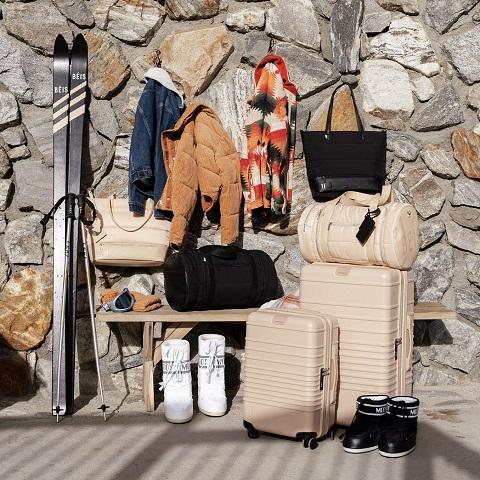When planning for a trip, it can be easy to feel like luggage comes last. Maybe you’ve already created a strict budget, made a hundred reservations, and agonized over what you’re going to wear. When it’s time to grab the luggage, you might want to just settle for whatever gets you from point A to point B.
But a lot can happen between point A and point B. One thing is for sure: You need travel luggage sets that will last you throughout this journey and many more.
So, what makes good luggage? And between hard or soft luggage, which one will not only get you where you need to go, but with comfort and ease? This article will guide you through everything you should consider when deciding on hardside vs softside luggage and keep in mind, soft and hardsided luggage both pair perfectly with our travel bags for women:
- Cleanliness
- Accessibility
- Flexibility
- Durability
- Mobility
- Protection
- Weight
Cleanliness
When it comes to how to clean a suitcase and keeping them clean, is hard or a soft sided suitcase better?
While hard sided luggage is more prone to scuffing, these scuffs can be buffed away quite easily while soft sided luggage tends to take on more persistent damage from:
- Dirt – The fabric of soft sided luggage can make dirt more noticeable than it does on hard sided luggage. Also, the slicker surface of hard sided luggage can make it easy to wipe away dirt with a stray cafe napkin as you wait for your flight. When it comes to soft shell luggage, causal wiping can quickly turn into vigorous scrubbing, until you realize only soap and water will really do the job.
- Germs – Soft sided luggage is made of more porous fabric, while hard case luggage is made of less absorbent material. With a hard sided suitcase, you can worry less about germs burrowing into the material of your suitcase, and you can wash away germs more easily.
- Smells – Soft luggage can absorb water, making it easier for it to trap smells and (if it stays wet for too long) mold and mildew.
- With a hardsided suitcase, you can expect a level of water resistance that resists smelliness too.
Accessibility
There are plenty of situations where soft sided luggage makes your stuff more accessible. For example, this comes in handy in a cramped space where you can just squeeze your hand through a half-open zipper and get something out. Hard luggage can require you to completely open your bag which may not always be possible.
However, the lower accessibility you get with hard sided luggage may be more of a pro than a con. A cut or a slightly opened zipper on a soft suitcase can leave your items vulnerable to being lost or stolen. A hard sided suitcase requires more effort to get into, especially if it has a lock (as many hard suitcases do).

Flexibility
Soft sided suitcases—as is their namesake—are softer and more flexible than hard sided suitcases.
However, hard luggage has made great strides in flexibility. Many of today’s hard sided luggage is made with materials that offer more give than before:
- Polycarbonate – Polycarbonate luggage flexes a little to absorb impact (it’s flexible enough to be used in contact lenses). If you’re wondering if hard luggage cracks, polycarbonate makes that concern a thing of the past.

Want to Avoid Overpacking? Hard Luggage is the Secret
The flexibility of soft luggage may appeal to doomsday packers, but in many instances, overpacking is an emotional response rather than a rational one. If you’re trying to curb your overpacking ways, hard luggage might actually do the trick. The rigidness of a hard sided suitcase can not only keep you from filling the limited space in your accommodations with the three extra outfits you brought, but it can also save you money by keeping your baggage weight in check.
Durability
If you’re an avid traveler, you’ll want luggage that will stand up to all your adventures and not need frequent replacing. A quality hard sided suitcase can be the answer to this because hard luggage is:
- Less prone to ripping – As mentioned above, it’s so much more tempting to overpack with a soft suitcase. If you’re prone to overpacking, your poor zippers are working overtime and it’s a matter of time before you start to see tears in your luggage. This is not a problem with hard luggage.
- More weather resistant – While a quality soft suitcase shouldn’t just disintegrate in the snow or wash away in the rain, hard luggage is simply better at standing up to weather conditions because it doesn’t take on as much water.
- More resistant to wear-and-tear – Over time, luggage inevitably gets beat up. The material of hard sided luggage resists this by absorbing less dirt, grease, and water, which maintains the quality of the luggage. Also, luggage made with polycarbonate is more scratch resistant than the plastic materials of the past.
Mobility
Have you ever tried to wheel a bloated, overstuffed soft suitcase around a crowded airport or onto a tight bus? It’s, to put it delicately, an experience. You’re half-wheeling and half-lifting a leaning suitcase with a very unpredictable range of motion. And if you’re in a hurry? Good luck.
On the other hand, hard sided suitcases are easy to roll (either behind, in front, or beside you). Also, the rigidness of a hard sided suitcase makes it more stable, even when it’s heavily packed.
So, in situations where you need to bob, weave, and glide quickly, hard luggage is the obvious choice.
Protection
If you’re traveling with valuable, breakable items, hard luggage is the way to go. Soft luggage can squish and flatten under the weight of other luggage, but hard luggage will keep its shape, so that the stuff inside isn’t smashed. This is particularly important if you’re traveling with electronics, lotions, sunscreens, shampoos, or wine bottles.
Weight
The weight of hard sided luggage vs soft sided luggage will depend on the individual luggage, but you may be surprised to find that many hard suitcases made of polycarbonate can be lighter than some soft luggage.
What About Aluminum Luggage?
So, we talked mostly about how soft luggage compares to polycarbonate luggage because of how common they are, but aluminum is another kind of hard luggage you may be considering for your travels. How does it stack up?
Cleanliness
Aluminum luggage is pretty comparable to polycarbonate in its ability to stay clean. Neither of them need much more than a wipe-down to get off dirt.
Flexibility
Aluminum luggage is the least flexible of the current suitcase options on the market. Most people aren’t the most efficient packers, and while polycarbonate suitcases nudge you to stop overpacking, aluminum suitcases give you a real shove.
Weight
Since aluminium is such a heavy material, aluminum suitcases can really pack on the pounds, which can be uncomfortable in your hands and a bit scary to lift into the overhead bin.
Durability
An aluminum suitcase is designed to be nearly indestructible, and its rigid frame offers supreme protection of the items inside it. It is also resistant to weather and water. So, one of these could last you a lifetime.
Well, it could last you a lifetime if you’re willing to look past all its nicks, dings, and dents that it will inevitably collect. Aluminum suitcases are far worse than soft or polycarbonate luggage at hiding their battle scars.
Cost
Aluminum luggage is in the upper echelon price-wise. But for a heavy suitcase with very little flexibility that’s bound to show all its bang-ups, you probably won’t consider this option very cost-efficient.

So, Is Hard or Soft Luggage Better?
Here’s the recap of the hard shell vs soft shell luggage battle.
Soft luggage is:
- More accessible
- More flexible
While hard polycarbonate luggage is:
- Easier to keep clean
- More secure than softside luggage
- Less prone to overstuffing
- More durable than soft luggage
- More mobile
- Better than soft luggage at protecting breakable items
- Able to be very lightweight
Finally, aluminum luggage is:
- The most durable
- The least prone to overstuffing
- The best at protecting breakable items
In several categories, hardside luggage takes the gold (and all the clothes; hurry up, we need to get packing!).
BEIS Hard Luggage: Made for Traveling in Style
This is why BEIS specializes in polycarbonate, hard shell luggage that can go anywhere you go. Along with the standard features of hard luggage, BEIS offers:
- An extra 2 inches of expandable space – Throwing in one more outfit won’t hurt.
- A weight indicator – Avoid overweight fees. Being prepared shouldn’t cost you.
- TSA approved locks – No one is getting a hold of your favorite little black dress.
- Water resistant zipper tape – This makes your luggage a fortress against water.
- Retractable bag attach strap – On the days when you’re carrying bags on top of bags, let your suitcase do some of the work. It can hold up to 15 pounds of luggage for you.
Whatever adventure you are on, trust BÉIS to provide suitcases that are along for the ride.
Sources:
-
Peter Greenburg. What to Consider Before Buying Soft or Hard Shell Luggage. https://petergreenberg.com/2014/07/29/consider-buying-soft-hard-shell-luggage/
-
Expert World Travel. Hard Side vs Soft Side Luggage. https://expertworldtravel.com/hardside-vs-softside-luggage/
-
Consumer Reports. Choosing Between Hard-Sided and Soft-Sided Luggage. https://www.consumerreports.org/luggage/choosing-between-hard-sided-luggage-and-soft-sided-luggage/
-
Vox.The psychology behind over- (and under-) packing. https://www.vox.com/the-goods/2020/1/16/21065669/psychology-over-under-packing
- Map Happy. The Key Difference Between Polycarbonate and Aluminum Suitcases. https://maphappy.org/2018/12/road-tested-the-core-differences-between-polycarbonate-and-aluminum-suitcases/





